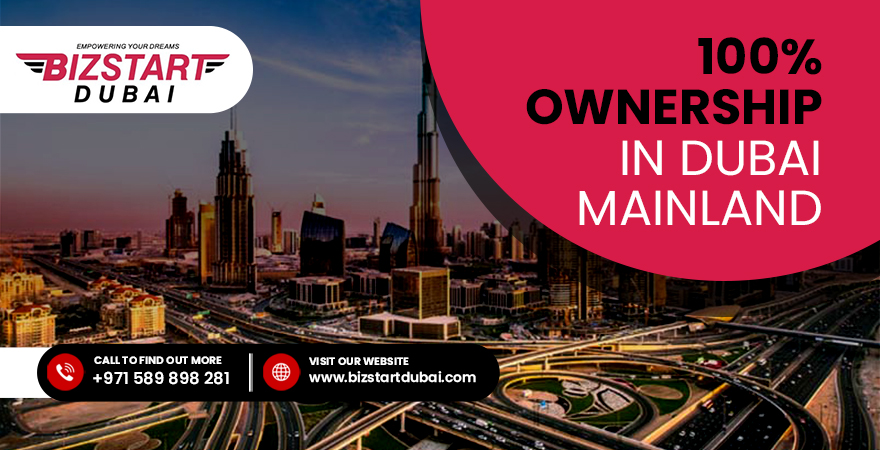UAE’s world-class business infrastructure gives investors and entrepreneurs from all over the world a great chance to set up their businesses there.
UAE has helped businesses take advantage of a great macroeconomic environment and fine incentives. Due to its widespread appeal, it is assumed that about 90% of the population is foreign-born.
In Dubai mainland, people can now own 100% of property; hence it is now possible.
If you want to start a business in Dubai mainland, you are headed in the right direction.
People from other countries have always been able to start businesses in the UAE, but they could not keep 100% ownership when they worked on the mainland. This is no longer case right now.
In this article, we will talk about what has changed and why.
What changed from 100% ownership in Dubai Mainland?
Until recently, business owners starting businesses on the UAE’s mainland could only keep a 49% ownership stake. A local sponsor would hold the remaining 51%.
These sponsors could be either private citizens or businesses. If there were any individuals, they had to be Emirati citizens and be in a position of authority.
Sponsors received a yearly payment in exchange for their support, but they had no involvement in business decisions or shared in any profits.
This rule was not without exceptions. Instead, it had a few exceptions.
Professional services firms could have foreign nationals as the sole owners.
International business owners also had the option of establishing their companies in a free zone, where they would always enjoy 100% ownership, zero currency restrictions, 100% exemptions from customs taxes, and the ability to repatriate their profits and cash.
The new regulations’ official wording is as follows:
According to the requirements of Federal Decree-Law No. 26 of 2020 revising the provisions of Federal Law No. 2 of 2015 on Commercial Firms, “Foreigners are authorized to incorporate companies with 100% complete ownership.”
The law eliminates the need for commercial businesses to have a significant Emirati shareholder or agent, granting non-Emiratis of all nationalities full foreign ownership of onshore companies founded by them.
Also, companies that want to become joint stock companies can now sell no more than 70% of the company through an initial public offering (IPO) instead of just 30% before.
What are the criteria for 100% ownership in Dubai mainland?
People who want to start a business in Dubai are most affected by the change in ownership rules right now.
About half of the businesses that Dubai’s Department of Economic Development (DED) lets people start can be owned 100% by foreigners.
Industry sectors, including oil and gas, telecommunications, and transportation, are notable exceptions to this rule.
The laws are a little bit different outside of Dubai. While Abu Dhabi does allow 100% ownership in rare circumstances, international business owners are often required to follow the 49/51 criterion and collaborate with a local sponsor.
Other emirates, like Sharjah and Umm Al Quwain, have not yet provided specifics about how they will implement 100% foreign ownership.
Perks of 100% ownership of the business in Dubai mainland?
The new foreign ownership laws are meant to make the UAE an even more appealing destination for foreign investment.
The country will be on track with other major economic centers by allowing this ownership in most situations.
Additionally, the move would increase market competitiveness, which will help the UAE economy grow and diversify.
Now that they can legally do so, foreign investors can run their businesses without any restrictions or obstacles relating to administration.
Five steps to start a 100%-owned business in the Dubai mainland
Follow these steps:
1. Choose your business activities
First things first!
To begin, you must specify your desired business activities and determine if they are on the DED’s approved list.
Before moving forward, it is crucial to check that your selected activity or activities allow for 100% ownership.
2. Pick a suitable business name & get it registered
Now is the time to decide on a name for your company.
In the United Arab Emirates, there are specific naming conventions that you must follow while picking a company name.
You must refrain from using vulgar or unpleasant words.
3. Submit an application for a license
You can now submit an application for your UAE trading license. This application is addressed to the DED. This procedure is frequently done online.
If you face any difficulty in filling out and submitting the application, you can consult our professionals. Bizstart has a pool of qualified and experienced business consultants that can assist you by overseeing the full application procedure on your behalf.
Contact us for more details.
4. Submit the visa application
For employment in the UAE, you must have a residency visa.
Getting a visa involves several steps, such as a biometric scan, a blood test, a medical exam, and a chest X-ray.
You can also sponsor others for visas if you hold a UAE trade license. This could be a household helper like a housekeeper, spouse, parent, or child.
5. Open a business bank account
You need a corporate bank account.
It is not always simple for people who are not residents of the UAE to obtain banking services; thus, it is wise to collaborate with a professional business consulting agency like Bizstart while tackling this stage of the procedure.
Bizstart: a one-stop solution for all your business needs!
We are among the pioneers in the business consulting industry. Bizstart has been providing matchless assistance to businessmen who want to set up a business in Dubai.
Our agency provides full-fledged business setup services. Our specialists have made the business-formation process simpler and easier, thanks to their expertise.
So if you want to set up a company in Dubai, do not hesitate to contact us. We are at your doorstep to assist you.

